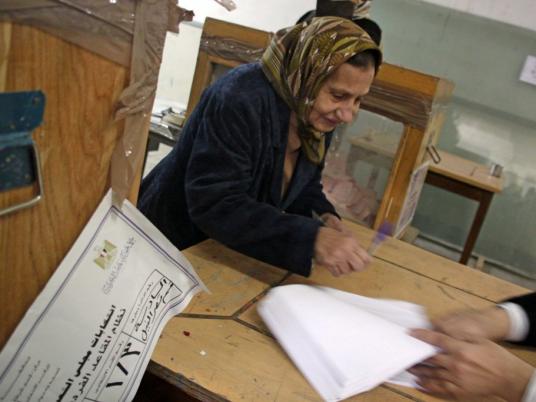
The Egyptian press on Tuesday celebrates Egypt’s “first” parliamentary elections in decades, praising the high turnout of voters and the role of the armed forces in securing polling stations, despite reported irregularities. Several papers cite Google Egypt's dedication of its logo to the elections.
Commentators see the elections as a positive step toward a democratic transition. In the privately owned newspaper Al-Shorouk, columnist Ahmed al-Sawy writes that this is only the beginning of Egypt's democratic transition, and that people will have a chance to rectify other problems in the future. He emphasizes that street protests remain an option and that right now the most important thing is for people to participate in the democratic process.
Many criticize reported irregularities related to logistics and campaigning around polling stations, reaching 1000 reported irregularities in Cairo and 191 In Alexandria, according to the privately owned Al-Tahrir. Columnist Naglaa Bedair cites the case of the fifth district in Cairo, where numbers assigned to candidates were changed on the election day, causing “confusion for voters, particularly since many are illiterate and relied on memorizing the numbers and symbols of candidates.”
The privately owned Al-Dostour writes about the suspension of an officer at Ain Shams police station for delaying the delivery of ballots to the polling station until after noon. Similar delays were reported in Helmeyet al-Zeiton and Mattareya districts in eastern Cairo, where the ballots did not arrive until 5 pm.
Several political parties are filing complaints against others regarding campaigning around polling stations. The Muslim Brotherhood’s Freedom and Justice Party (FJP) will take legal action against the Egyptian Bloc, which it says violated campaign regulations in Helwan and distributed butane cylinders to influence voting in the shantytown of Manshiet Nasser, according to the party's newspaper. The Wafd Party will be taking action against the FJP, Egyptian Bloc and Free Egyptians Party as they violated “all laws,” according to the party’s paper.
In addition to their election coverage, most papers touch on the situation in Tahrir Square. Voters near Mohamed Mahmoud Street told the FJP paper that the Tahrir sit-in has further inspired people to vote, to “end the period that was marked by chaos.” The paper also cites a statement by Islamic intellectual and presidential hopeful Mohamed Selim al-Awa to a privately owned TV station, in which he accused people calling for the creation of a national salvation government of being traitors, arguing that they are affiliated with Western interests in the region.
FJP columnist Rafik Habib criticizes the mass protests that occupied several squares in Egypt over the past two weeks as an attempt to “stop the political process and impose an unelected authority” on the people. “We are witnessing a real confrontation between building a democratic system based on people’s will as supported by most Islamic forces and building a restricted democratic system that imposes secular politics on the state and society, which is supported by most secular forces.”
Al-Tahrir Editor-in-Chief Ibrahim Eissa continues to question positions taken by various political groups regarding last week’s violence. He particularly cites the recent statement made by Brotherhood Supreme Guide Mohamed Badie about why the Brotherhood did not support protesters after the break-in violence, and asks him to clarify if the Brotherhood has been subject to outside pressure.
Adding to the Tahrir situation is a report issued by the National Research Center to the Health Ministry on the use of tear gas against protesters. According to the state-owned Al-Akhbar, the report confirms that based on tested samples, the tear gas used primarily on Mohamed Mahmoud Street was not toxic.
Still, the public remains suspicious. Customs officials at a Suez port refused to allow a shipment of 7 tons of tear gas canisters imported by the Interior Ministry from an American company for fear it would be "used against protesters,” according to Al-Shorouk. An additional 14 tons are due to be delivered over the next week.
Another repercussion of the Tahrir sit-in was the ruling military council’s decision to transfer the case over the killings at Maspero from a military court to a state security emergency court. Monday witnessed the first hearing for blogger and activist Alaa Abd El Fattah, and Al-Shorouk publishes the details of the hearing. Abd El Fattah has been under investigation by the military prosecution since October. The state security emergency court has extended Abd El Fattah's detention for another 15 days.
The hearing lasted for five hours and three new charges were made against Abd El Fattah, including intent to commit a terrorist attack. Abd El Fattah, who had until then refused to speak in front of the military court, finally did, denying all charges and saying that the two witnesses ― Abdel Aziz Fahmy, from the Freedom Egypt Party and Hanan Khwasik, a journalist at Al-Wafd newspaper ― are making unfounded allegations against him. His lawyer, Ahmed Saif al-Islam, requested calling blogger Alaa Abbas as a witness and transferring the case to a normal judicial court to avoid any possible pressure from the military, which is implicated in the case.
Egypt's papers:
Al-Ahram: Daily, state-run, largest distribution in Egypt
Al-Akhbar: Daily, state-run, second to Al-Ahram in institutional size
Al-Gomhurriya: Daily, state-run
Rose al-Youssef: Daily, state-run
Al-Dostour: Daily, privately owned
Al-Shorouk: Daily, privately owned
Al-Wafd: Daily, published by the liberal Wafd Party
Youm7: Daily, privately owned
Al-Tahrir: Daily, privately owned
Freedom and Justice: Daily, published by the Muslim Brotherhood's Freedom and Justice Party
Sawt al-Umma: Weekly, privately owned
Al-Arabi: Weekly, published by the Nasserist Party




